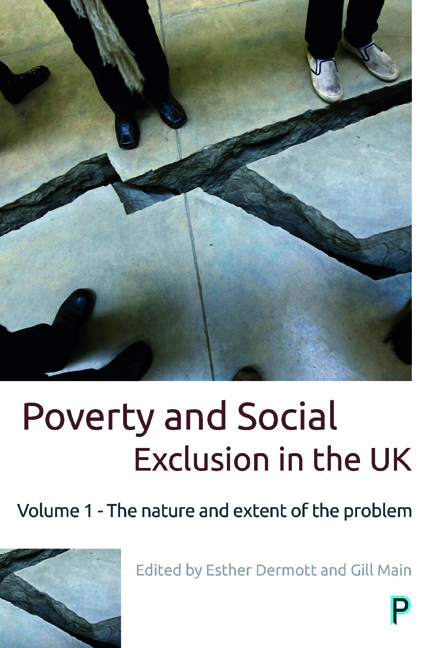Book contents
- Frontmatter
- Dedication
- Contents
- List of tables and figures
- Notes on contributors
- Acknowledgements
- Introduction: poverty and social exclusion in the UK
- One Measuring poverty in the UK
- Two The impoverishment of youth: poverty, deprivation and social exclusion among young adults in the Uk
- Three Improvement for some: poverty and social exclusion among older people and pensioners
- Four Which men and women are poor? Gender, poverty and social exclusion
- Five Better understandings of ethnic variations: ethnicity, poverty and social exclusion
- Six Improving lives? Child poverty and social exclusion
- Seven The cost of children: parents, poverty, and social support
- Eight A worsening picture: poverty and social exclusion and disabled people
- Nine Devolution and North/South division: poverty and social exclusion in the countries and regions of the UK
- Ten More similarities than differences: poverty and social exclusion in rural and urban locations
- Conclusion: innovating methods, informing policy and challenging stigma
- Technical appendix
- Index
Ten - More similarities than differences: poverty and social exclusion in rural and urban locations
Published online by Cambridge University Press: 08 April 2022
- Frontmatter
- Dedication
- Contents
- List of tables and figures
- Notes on contributors
- Acknowledgements
- Introduction: poverty and social exclusion in the UK
- One Measuring poverty in the UK
- Two The impoverishment of youth: poverty, deprivation and social exclusion among young adults in the Uk
- Three Improvement for some: poverty and social exclusion among older people and pensioners
- Four Which men and women are poor? Gender, poverty and social exclusion
- Five Better understandings of ethnic variations: ethnicity, poverty and social exclusion
- Six Improving lives? Child poverty and social exclusion
- Seven The cost of children: parents, poverty, and social support
- Eight A worsening picture: poverty and social exclusion and disabled people
- Nine Devolution and North/South division: poverty and social exclusion in the countries and regions of the UK
- Ten More similarities than differences: poverty and social exclusion in rural and urban locations
- Conclusion: innovating methods, informing policy and challenging stigma
- Technical appendix
- Index
Summary
Introduction
This chapter focuses on the differences in poverty and social exclusion between rural and urban locations in the UK. It examines differences in material terms, including levels of poverty as well as broader measures of living standards. It also explores wider aspects of social exclusion. Given space constraints, we cannot look at all of the domains covered by the 2012 Poverty and Social Exclusion Survey (PSE-UK 2012) so we focus on one or two aspects for each of the three broad areas of resources, participation and quality of life. Under resources, we look at access to services as this is widely seen as problematic in more rural areas. For participation, we examine employment, because of its importance both as a form of participation but also as the key means to access resources. In relation to quality of life, we look at housing and neighbourhood environment: some aspects of housing quality are often seen as more problematic in rural areas while neighbourhood problems are more obviously an urban issue. Finally, we look at health and well-being as a domain with interesting differences which have perhaps been less discussed in the literature.
The differences we explore matter in two ways. The first is for judgements about the relative needs of different areas. In the UK, there has long been a strategy of distributing resources for local public services in a way which takes account of the relative needs of areas. This is apparent in the formulae used by national governments to allocate funding to local government and health services, for example. Measures which attempt to identify relative needs therefore attract close scrutiny with intense arguments about the biases which may arise from particular measures (Bailey et al, 2003; Bailey et al, 2016). One strength of the PSE-UK 2012 survey is that it allows us to compare locations using multiple measures of poverty and hence to make more rounded judgements about the biases in each and hence about relative needs.
The second is about the nature of needs in different areas. Here the central issue is whether a single national policy approach to tackling poverty or social exclusion is appropriate, or whether the differences in the nature of problems require distinctive urban and rural policies to be developed.
- Type
- Chapter
- Information
- Poverty and Social Exclusion in the UK Vol 1The Nature and Extent of the Problem, pp. 219 - 238Publisher: Bristol University PressPrint publication year: 2017

